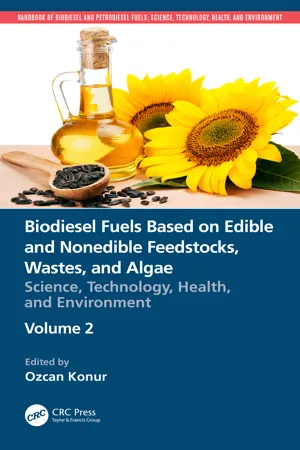
Biodiesel Fuels Based on Edible and Nonedible Feedstocks, Wastes, and Algae
Science, Technology, Health, and Environment
- 402 pages
- English
- ePUB (mobile friendly)
- Available on iOS & Android
Biodiesel Fuels Based on Edible and Nonedible Feedstocks, Wastes, and Algae
Science, Technology, Health, and Environment
About this book
This second volume of the Handbook of Biodiesel and Petrodiesel Fuels presents a representative sample of the population papers in the field of feedstock-specific biodiesel fuels.
The research on feedstocks for biodiesel fuels has first focused on the edible oils as first-generation biodiesel fuels. However, the public concerns about the competition with foods based on these feedstocks and adverse impact on the ecological diversity and deforestation have resulted in the exploration of nonedible-oil-based biodiesel fuels as second-generation biodiesel fuels in the first instance.
Due to the ecological and cost benefits of treating wastes, waste oil-based biodiesel fuels as third-generation biodiesel fuels have emerged. Furthermore, following a series of influential review papers, the research has focused on the algal oil-based biodiesel fuels in recent years. Since the cost of feedstocks in general constitutes 85% of the total biodiesel production costs, the research focused more on improving biomass and lipid productivity in these research fields. Furthermore, since water, CO2, and nutrients (primarily N and P) have been major ingredients for the algal biomass and lipid production, the research has also intensified in the use of wastewaters and flue gases for algal biomass production to reduce the ecological burdens and the production costs.
Part 1 presents a representative sample of the population papers in the field of edible oil-based biodiesel fuels covering major research fronts. It covers soybean oil-based biodiesel fuels, palm oil-based biodiesel fuels, and rapeseed oil-based biodiesel fuels as case studies besides an overview paper.
Part 2 presents a representative sample of the population papers in the field of nonedible oil-based biodiesel fuels covering major research fronts. It covers Jatropha oil-based biodiesel fuels, polanga oil-based biodiesel fuels, and moringa oil-based biodiesel fuels as case studies besides an overview paper.
Part 3 presents a representative sample of the population papers in the field of waste oil-based biodiesel fuels covering major research fronts. It covers wastewater sludge-based biodiesel fuels, waste cooking oil-based biodiesel fuels, and microbial oil-based biodiesel fuels as case studies besides an overview paper.
Part 4 presents a representative sample of the population papers in the field of algal oil-based biodiesel fuels covering major research fronts. It covers algal biomass production in general, algal biomass production in wastewaters, algal lipid production, hydrothermal liquefaction of algal biomass, algal lipid extraction, and algal biodiesel production besides an overview paper.
This book will be useful to academics and professionals in the fields of Energy Fuels, Chemical Engineering, Physical Chemistry, Biotechnology and Applied Microbiology, Environmental Sciences, and Thermodynamics.
Ozcan Konur is both a materials scientist and social scientist by training. He has published around 200 journal papers, book chapters, and conference papers. He has focused on the bioenergy and biofuels in recent years. In 2018, he edited 'Bioenergy and Biofuels', that brought together the work of over 30 experts in their respective field. He also edited 'Handbook of Algal Science, Technology, and Medicine' with a strong section on the algal biofuels in 2020.
Frequently asked questions
- Essential is ideal for learners and professionals who enjoy exploring a wide range of subjects. Access the Essential Library with 800,000+ trusted titles and best-sellers across business, personal growth, and the humanities. Includes unlimited reading time and Standard Read Aloud voice.
- Complete: Perfect for advanced learners and researchers needing full, unrestricted access. Unlock 1.4M+ books across hundreds of subjects, including academic and specialized titles. The Complete Plan also includes advanced features like Premium Read Aloud and Research Assistant.
Please note we cannot support devices running on iOS 13 and Android 7 or earlier. Learn more about using the app.
Information
Table of contents
- Cover
- Half Title
- Title Page
- Copyright Page
- Table of Contents
- Preface
- Acknowledgements
- Editor’s Biography
- List of Contributors
- Part V: Edible Oil-based Biodiesel Fuels
- Part VI: Nonedible Oil-based Biodiesel Fuels
- Part VII: Waste Oil-based Biodiesel Fuels
- Part VIII: Algal Biodiesel Fuels
- Index